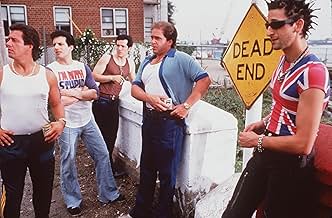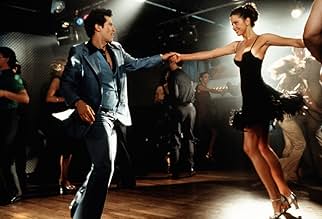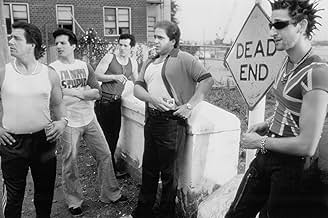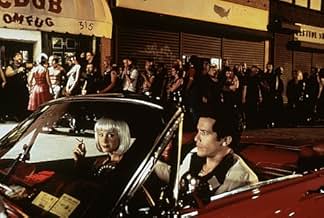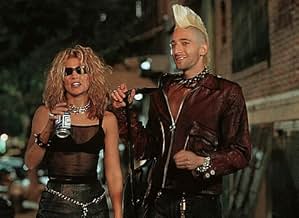La versión de Spike Lee de los asesinatos de "El hijo de Sam" en Nueva York durante el verano de 1977 se centra en los habitantes de un vecindario italoamericano al noreste del Bronx que viv... Leer todoLa versión de Spike Lee de los asesinatos de "El hijo de Sam" en Nueva York durante el verano de 1977 se centra en los habitantes de un vecindario italoamericano al noreste del Bronx que viven con miedo y desconfían unos de otros.La versión de Spike Lee de los asesinatos de "El hijo de Sam" en Nueva York durante el verano de 1977 se centra en los habitantes de un vecindario italoamericano al noreste del Bronx que viven con miedo y desconfían unos de otros.
- Dirección
- Guionistas
- Elenco
- Premios
- 7 nominaciones en total
- Mario
- (as Arthur Nascarella)
Opiniones destacadas
Unfortunately, many of the subsidiary characters, who surround these two and keep pulling us away from them, emerge as little more than ethnic and sexual stereotypes, from the neighborhood mob boss (Ben Gazarra) to the loving-father drug dealer to the punk rock iconoclast to the local flaming "fairy." Not even strong performances by a game cast can infuse these roles with the depth and humanity necessary to justify their inclusion in the film.
Stylistically, this film is much less visually flashy than previous Lee works with less elaborate camerawork and only the occasional near-subliminal quick cuts (used to convey memories) to distract us. Lee should, also, have avoided at all costs the temptation to cast himself as an on-site news reporter. Even more egregiously, why oh why did Lee feel compelled to visualize literally (through animatronics) the demon dog that Berkowitz reportedly cited as the motivation for his crimes actually barking out instructions to the crazed psychopath?
The risk in these docudramas is that the moviemakers will not be able to match, in their narrative, the compelling nature of the actual events upon which they are based. Lee's film is no exception, for just as the killer is captured, the fictional side of the story resolves itself in a flurry of heavy handed "Ox Bow Incident" melodramatics, scarcely credible even for a cadre of characters as lacking in common sense as these are. "Summer of Sam" is notable for the performances of John Leguizamo and Mira Sorvino in the central roles, its disco-drenched soundtrack and its letter-perfect recreation of a particular moment in recent American history. What a shame, then, that the film never really coheres into a satisfying whole.
P.S.: The seventies soundtrack is magnificent!
Summer of Sam brutally zooms in on an Italian-American South Bronx neighbourhood in the summer of 1977 -- the hottest summer ever, a real killer. Lee does not shy away from sex, drugs, raunchy dialogue or violence in his portrayal of the events which are based on reality of the summer nights when Sam murdered women on the streets. As the Bronx inhabitants grow anxious and suspicious of the murders, Summer of Sam focuses its story on Vinny (John Lequizamo), his marriage with Dionna (Mira Sorvino) and his friends and we see how the killings affect their lives, while plating the "Son of Sam" himself in the backseat to make room for these dynamic characters.
I can admit that there is no strong point or focus in this film, but I don't think it's entirely necessary. It's a portrayal, and a realistic one at that -- it is also a portrayal of an era, the 1970s and this is most apparent in the flashy 54-styled nightclubs that Vinny and Dionna go to. It occasionally drags on, but this is good because it emphasizes the terrible heat and anxiousness of the city, making it almost nightmarish. It is so realistic that you can almost feel the heat and dirt on your clothes as if you were right there in steaming hot New York City. I therefore feel that a great deal of praise is due to a film that succeeds in being haunting without actually dealing with the murders head-on.
8/10
¿Sabías que…?
- TriviaSpike Lee was facing a lot of negative feedback from the family members of the victims who didn't want a film being made which might glorify the killer in some manner. As a result, the script had to be changed which focused more on the community than the killer himself. "Son of Sam" was rumored to be the original working title.
- ErroresAt the beginning of the movie, set in the summer of 1977, characters are seen dancing in a disco to the song "There But For the Grace of God Go I" by Machine. The song wasn't recorded until 1979.
- Citas
Vinny: Come on, get in the car. Please, baby.
Dionna: Baby? Don't you dare "baby" me! I'm gonna wait here! I'm gonna wait here until somebody comes along. You know what? I'm gonna wait here until some soul brother comes along in his big black Cadillac. And you know and I know that he's got a big black dick too.
Vinny: Don't talk like that, just get inside the car.
Dionna: Oh, fuck you!
Vinny: Please, please, don't make me have to beg you. Get in the car. Come on- don't make me have to hurt you.
Dionna: Hurt me? Don't you even fuckin' lay a pinkie on me! I'll get him to kick your ass and then I'll fuck 'em! You wanna watch Vinny? Will that turn you on Vinny? You linguine dick mother fucker. You wanna watch while I suck a big black dick in the back of a big black cadillac?
- Créditos curiososThe credits are in the form of newspaper headlines.
- Versiones alternativasAfter they are refused entry into Studio 54, the sex scene between Dionna (Mira Sorvino) and Vinny (John Leguizamo) included more explicit shots in the original cut. This scene was edited a bit after the MPAA threatened the film with an "NC-17" rating.
- ConexionesEdited into Doggiewoggiez! Poochiewoochiez! (2012)
- Bandas sonorasFernando
Written by Benny Andersson, Stig Anderson and Björn Ulvaeus (as Bjorn Ulvaeus)
Performed by ABBA
Courtesy of Polar Music International AB
Under license from Universal Music Special Markets
Selecciones populares
- How long is Summer of Sam?Con tecnología de Alexa
- Is "Summer of Sam" based on a book?
- Who was the "Son of Sam"?
- If David Berkowitz was the "son" of Sam, who was Sam?
Detalles
- Fecha de lanzamiento
- País de origen
- Idiomas
- También se conoce como
- Summer of Sam
- Locaciones de filmación
- Bronx, Nueva York, Nueva York, Estados Unidos(On Morris Park Ave. between Williamsbridge Rd. and Bronxdale Ave.)
- Productoras
- Ver más créditos de la compañía en IMDbPro
Taquilla
- Presupuesto
- USD 22,000,000 (estimado)
- Total en EE. UU. y Canadá
- USD 19,288,130
- Fin de semana de estreno en EE. UU. y Canadá
- USD 5,952,452
- 4 jul 1999
- Total a nivel mundial
- USD 19,288,130
- Tiempo de ejecución2 horas 22 minutos
- Color
- Mezcla de sonido
- Relación de aspecto
- 1.85 : 1
Contribuir a esta página




